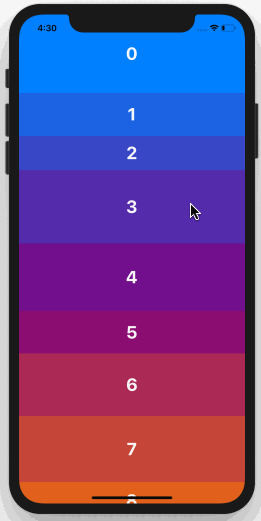A drag-and-drop-enabled FlatList component for React Native.
Fully native interactions powered by Reanimated and React Native Gesture Handler.
To use swipeable list items in a DraggableFlatList see React Native Swipeable Item.
- Follow installation instructions for reanimated and react-native-gesture-handler. RNGH requires you to make changes to
MainActivity.java. Be sure to follow all Android instructions! - Install this package using
npmoryarn
with npm:
npm install --save react-native-draggable-flatlist
with yarn:
yarn add react-native-draggable-flatlist
import DraggableFlatList from 'react-native-draggable-flatlist'
All props are spread onto underlying FlatList
| Name | Type | Description |
|---|---|---|
data |
T[] |
Items to be rendered. |
horizontal |
boolean |
Orientation of list. |
renderItem |
(params: { item: T, index: number, drag: () => void, isActive: boolean}) => JSX.Element |
Call drag when the row should become active (i.e. in an onLongPress or onPressIn). |
renderPlaceholder |
(params: { item: T, index: number }) => React.ReactNode |
Component to be rendered underneath the hovering component |
keyExtractor |
(item: T, index: number) => string |
Unique key for each item |
onDragBegin |
(index: number) => void |
Called when row becomes active. |
onRelease |
(index: number) => void |
Called when active row touch ends. |
onDragEnd |
(params: { data: T[], from: number, to: number }) => void |
Called after animation has completed. Returns updated ordering of data |
autoscrollThreshold |
number |
Distance from edge of container where list begins to autoscroll when dragging. |
autoscrollSpeed |
number |
Determines how fast the list autoscrolls. |
onRef |
(ref: React.RefObject<DraggableFlatList<T>>) => void |
Returns underlying Animated FlatList ref. |
animationConfig |
Partial<Animated.SpringConfig> |
Configure list animations. See reanimated spring config |
activationDistance |
number |
Distance a finger must travel before the gesture handler activates. Useful when using a draggable list within a TabNavigator so that the list does not capture navigator gestures. |
layoutInvalidationKey |
string |
Changing this value forces a remeasure of all item layouts. Useful if item size/ordering updates after initial mount. |
onScrollOffsetChange |
(offset: number) => void |
Called with scroll offset. Stand-in for onScroll. |
onPlaceholderIndexChange |
(index: number) => void |
Called when the index of the placeholder changes |
dragItemOverflow |
boolean |
If true, dragged item follows finger beyond list boundary. |
dragHitSlop |
object: {top: number, left: number, bottom: number, right: number} |
Enables control over what part of the connected view area can be used to begin recognizing the gesture. Numbers need to be non-positive (only possible to reduce responsive area). |
debug |
boolean |
Enables debug logging and animation debugger. |
import React, { Component } from "react";
import { View, TouchableOpacity, Text } from "react-native";
import DraggableFlatList from "react-native-draggable-flatlist";
const exampleData = [...Array(20)].map((d, index) => ({
key: `item-${index}`, // For example only -- don't use index as your key!
label: index,
backgroundColor: `rgb(${Math.floor(Math.random() * 255)}, ${index *
5}, ${132})`
}));
class Example extends Component {
state = {
data: exampleData
};
renderItem = ({ item, index, drag, isActive }) => {
return (
<TouchableOpacity
style={{
height: 100,
backgroundColor: isActive ? "blue" : item.backgroundColor,
alignItems: "center",
justifyContent: "center"
}}
onLongPress={drag}
>
<Text
style={{
fontWeight: "bold",
color: "white",
fontSize: 32
}}
>
{item.label}
</Text>
</TouchableOpacity>
);
};
render() {
return (
<View style={{ flex: 1 }}>
<DraggableFlatList
data={this.state.data}
renderItem={this.renderItem}
keyExtractor={(item, index) => `draggable-item-${item.key}`}
onDragEnd={({ data }) => this.setState({ data })}
/>
</View>
);
}
}
export default Example;